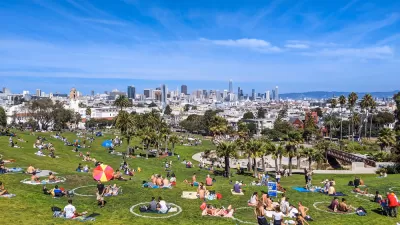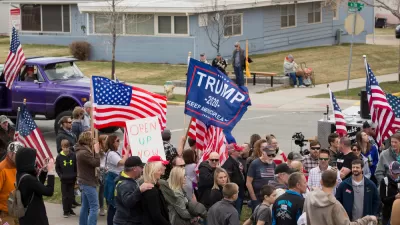A midwestern commuter rail line found a unique, if controversial way to achieve 100 percent mask compliance on its trains: Set aside one car, though preferably not the bike car, for riders who opt to travel maskless.
John Greenfield, editor of Streetsblog Chicago, rode his bike last week to Millennium Station and then headed to the bike car of a South Shore Line interurban train to embark on a camping trip to the Indiana Dunes National Park. He was startled to find that the bike car doubled as a "mask-optional" car.
"When I tweeted a photo of the Mask Optional Car’s sandwich board [on the station platform], there was a nearly universal reaction of disbelief and horror from transit advocates," wrote Greenfield on Sept. 23. "No one was aware of any other U.S. rail systems that are accommodating anti-maskers this way."
Greenfield notes in a Sept. 24 update that "NBC Chicago did a follow-up report on the Mask Optional Cars, including an interview with passengers who chose to ride in one of the controversial rail cars."

Courtesy of South Shore Line
After the trip, Greenfield spoke with Mike Noland, president of the Northern Indiana Commuter Transportation District, which runs the South Shore Line.
Noland insisted that NICTD strongly believes in the importance of wearing masks on transit during the pandemic, and said conductors have a supply of spare masks to offer to passengers who lack facial coverings. “But as you know, there are people here who feel it’s their God-given right not to wear masks — they think it’s a government conspiracy.”
[He] argued that the Mask Optional Car policy has been a win in terms of mask compliance in the other rail carriages, and customers’ safety and comfort. (He said that the no-mask car is never supposed to be the same one as the bike car, and promised that NICTD’s chief operating officer is taking steps to ensure that mistake doesn’t happen again.)
“We had complaints (about mask non-compliance in the regular cars) before implementing this policy, but we’ve had zero issues since we put this in place,” Noland said. “We have 100-percent perfect compliance in the other cars nowadays..."
Indiana and the coronavirus
While the Hoosier State is clearly not among the midwestern states which are seeing the nation's highest number of new COVID-19 infections per capita, led by North Dakota, South Dakota, and Wisconsin, respectively, according to the Washington Post's coronavirus tracker on Sept. 27, it's not performing enough coronavirus testing and its test positivity rate is too high, according to the three metrics on the New York Times testing tracker and the Johns Hopkins Coronavirus Resource Center's testing hub, also on Sept. 27.
However, the state dashboard indicates a "7-day positivity rate of 4% from 09/14/2020 to 09/20/2020." The positivity needs to be below 5 percent to safely reopen, according to the World Health Organization.
Governor Eric J. Holcomb announced on Sept. 23 that he would advance the state to an updated version of the Stage 5 Back On Track Indiana plan, effective Sept. 26, and extend the state’s face covering mandate until at least Oct. 17. "The state will be removing size limits on restaurants, bars, nightclubs, gyms, conventions, museums and other large events," according to WTPA News.
Readers react
Greenfield's post has generated many comments, some of them rather heated, as comments tend to be. My favorite – from Kate Hickey:
This is so outrageously dangerous and moronic. These potential covid spreaders / potential killers, are being validated by being given the 'right' to abstain from protecting other human beings who want to stay safe from illness and death. They are being driven through Indiana and dumped off at Millennium Park and shouldn't be allowed off the train in Illinois, which has a mandate about mask wearing. J.B. Pritzker, Lori Lightfoot, why are you not putting an end to this!?
Related in Planetizen:
-
The Changing Geography of the Pandemic [cases surging in Midwest], August 27, 2020
-
Mask Mandates Without Enforcement Amount to Half-Measures, August 4, 2020
-
The South Shore Line, one of the Chicago Area's Oldest, Gets an Update, September 28, 2017
Hat tip to Kenyon Karl.
FULL STORY: Idiocy or genius? The South Shore Line tries quarantining anti-maskers in a separate car

Alabama: Trump Terminates Settlements for Black Communities Harmed By Raw Sewage
Trump deemed the landmark civil rights agreement “illegal DEI and environmental justice policy.”

Study: Maui’s Plan to Convert Vacation Rentals to Long-Term Housing Could Cause Nearly $1 Billion Economic Loss
The plan would reduce visitor accommodation by 25% resulting in 1,900 jobs lost.

Why Should We Subsidize Public Transportation?
Many public transit agencies face financial stress due to rising costs, declining fare revenue, and declining subsidies. Transit advocates must provide a strong business case for increasing public transit funding.

Paris Bike Boom Leads to Steep Drop in Air Pollution
The French city’s air quality has improved dramatically in the past 20 years, coinciding with a growth in cycling.

Why Housing Costs More to Build in California Than in Texas
Hard costs like labor and materials combined with ‘soft’ costs such as permitting make building in the San Francisco Bay Area almost three times as costly as in Texas cities.

San Diego County Sees a Rise in Urban Coyotes
San Diego County experiences a rise in urban coyotes, as sightings become prevalent throughout its urban neighbourhoods and surrounding areas.
Urban Design for Planners 1: Software Tools
This six-course series explores essential urban design concepts using open source software and equips planners with the tools they need to participate fully in the urban design process.
Planning for Universal Design
Learn the tools for implementing Universal Design in planning regulations.
Smith Gee Studio
Alamo Area Metropolitan Planning Organization
City of Santa Clarita
Institute for Housing and Urban Development Studies (IHS)
City of Grandview
Harvard GSD Executive Education
Toledo-Lucas County Plan Commissions
Salt Lake City
NYU Wagner Graduate School of Public Service





























